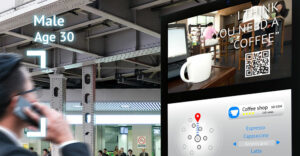The amount of data we create each day is astronomical. The digital universe likely will reach 44 zettabytes in 2020, according to the World Economic Forum. That is 40 times more bytes than there are stars existing in the observable universe.
As an indication of how fast this is moving, that number will grow to 175 zettabytes by 2025, according to the International Data Corporation.
To say that’s a lot of data is a colossal understatement — but is this truly surprising? After all, we can take phone calls from watches; stream music from refrigerators; open hotel, office and garage doors from phones; order dinner from Alexa; and check the weather from cars. With new technologies emerging every day, the digital overload we experience will only increase.
That’s why the power of human connection has never been more important.
Business leaders know that to acquire and retain customers, they need to build and nurture relationships. When the rest of the world is doing this only through digital channels, the smartest leaders also are connecting with their prospective customers offline.
These are the leaders championing event marketing — not only as an engagement and conversion channel, but also as an opportunity to develop thought leadership, build awareness, generate new demand, and strengthen customer loyalty.
However, today’s event marketing is not like yesterday’s.
The New Era of Event Marketing
Companies stepping into this new era of event marketing are discovering massive, untapped business value in repeatable, scaled event programs. From field marketing programs and roadshows to user groups and sales dinners, companies are going beyond the large tentpole conferences to reach people across the entire customer journey.
Companies are reporting significant investments into these kinds of events, according to SiriusDecisions, and for good reason. When event programs successfully scale, they can grow without adding more resources, ultimately leading to higher ROI and a greater business impact.
To support them, event marketers are looking to a new generation of technology platforms that will leverage automation and artificial intelligence to help them ask smarter questions and better understand their customers. They’re craving a disruptive new technology that targets the right people, personalizes event attendees’ experiences, connects attendees to each other, and so on — with minimal or no execution required from event marketers.
While so many other parts of business are using disruptive technologies — such as sales using CRM systems, and marketing using marketing automation platforms — event marketing has lagged behind. The fact is that this disruptive new technology doesn’t yet exist for event marketers.
Even so, smart leaders recognize that with or without this disruptive technology, they need to scale their event marketing programs, and they need to do it in a way that keeps their programs on brand, compliant and connected.
Event Marketing at Scale and the Value of Technology
Keeping your event programs cohesive while scaling is where things can get tricky, though, as this often means bringing other teams into the mix to build and host their own events. As scary as this sounds, it’s not only possible — it also can be easy, with the right event marketing technology.
The event marketers who are successfully scaling their programs in this way are embracing this as a new concept: event democratization.
“Event democratization” is the act of making event marketing tools accessible to a trusted group of individuals — typically nonmarketers — for use in building and hosting their own events.
The key to feeling comfortable with event democratization is data and design governance, or maintaining a level of control over your prospect and customer information, as well as brand elements and event designs.
Having final say over what data and design assets are available for other internal teams to use (and making them easy to access) gives event marketers the confidence that those teams will represent the organization effectively.
There are two primary ways to accomplish this through event marketing technology: event data integrations; and controlled, reusable event themes.
Driving Results With Technology Connections
An event data strategy is all too often an afterthought for event marketers, even though it is the single biggest differentiator between average and remarkable event programs. Tapping into the vast amount of event data available can mean more customized and valuable event experiences and follow-up communications for attendees, resulting in accelerated business results.
However, today’s most successful event marketers don’t just review this information. To scale their event data, they also integrate and share the data with other technologies used across their organization. This empowers other teams using those systems, such as sales teams using CRM systems, to use the data in their prospect and customer interactions and continue the momentum from their events.
For example, an integration between Salesforce and an event marketing technology should give a sales representative the insights and processes required to close more deals, connect events directly to revenue, and quickly know the answer to, “Is my prospect coming to our next event?”
More specifically, this kind of integration should let both event marketers and sales scale their event data and save time in the process by initiating event campaigns in either platform; updating campaign member statuses in real time; viewing event engagement by lead, contact or account; tracking every invitee, registrant and attendee; and collaborating on guests lists.
Eliminating Brand Destruction – For Good
Marketers know that an organization’s brand is more than just a logo and color scheme. It encompasses values, product experiences, and everything in between that helps customers build trust. This is why it’s important to maintain brand integrity. It impacts every prospect and customer, no matter where they are in their journey.
Although a brand is more than just an organization’s visual identity, that piece is important, because it’s literally how others identify an organization.
For as long as the practice of marketing has been around, marketers have struggled with other teams creating presentations, emails and sales slicks (to name a few) that may use the wrong colors, off-brand messaging, or an old logo. Event marketing is no exception.
With hundreds — or even thousands — of events each year, event marketing teams are more often handing off the smaller, repeatable events to their sales teams. Without the proper governance of event design assets, this can result in organizations hosting off-brand events that leave prospects with inconsistent experiences and brand confusion.
This is why scaling event design is critical when looking to scale a broader event marketing strategy. With the right technology, event marketers or their designers can create a library of on-brand, approved event designs that anyone in an organization can use, letting event marketers maintain a level of control while upholding brand integrity.
At the same time, they are empowering other teams to truly own their events from start to finish — and ultimately, giving themselves the gift of time.
Scale Is the Future of Event Marketing
Live, in-person events have the power to connect people through meaningful, immersive experiences. Although they’re one of the highest revenue-generating activities in marketing, they also can be a black hole of data, and destructive of the brand an organization has built.
Marketers know it’s nearly impossible to have a 100 percent complete picture of every single event interaction. However, collecting, integrating and using event data can be easy, as long as the right tool is in place that helps scale data.
Similarly, marketers know how agonizing it can be to build a world-class event strategy, only to see it derailed by off-brand event design. Finding an event marketing technology that scales event design with controllable, on-brand themes can be a game-changer for meeting this challenge.
Whether an organization is just beginning to develop an event marketing strategy or has had a sophisticated one for years, it’s always prime time to revisit its scalability and how technology can play a role in accomplishing it successfully.
After all, it’s not just about scaling event programs. It’s also about driving business outcomes through what event attendees are coming to expect in their event experiences — and that’s customization every step of the way.












































